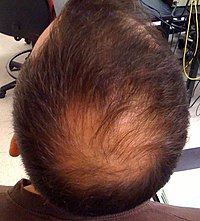
Photo from wikipedia
Chemotherapy-induced alopecia is a common and distressing adverse effect of many types of chemotherapy. Scalp cooling has been used since the 1970s for prevention of chemotherapy-induced alopecia; however, most data… Click to show full abstract
Chemotherapy-induced alopecia is a common and distressing adverse effect of many types of chemotherapy. Scalp cooling has been used since the 1970s for prevention of chemotherapy-induced alopecia; however, most data regarding this treatment modality are retrospective in nature, and use in the United States has been limited by safety concerns, specifically the potential for scalp metastases. Two prospective studies of scalp-cooling systems performed in the United States were published within the last year and add evidence supporting the efficacy and safety of scalp cooling in preventing chemotherapy-induced alopecia in patients receiving chemotherapy for solid tumor malignancies. Available data suggest that this technology is most effective for taxane-based chemotherapy regimens compared with anthracycline-based chemotherapy regimens. Two scalp-cooling devices have been cleared by the US Food and Drug Administration, and multiple cold caps are available for patient rental. The adverse effect profile of scalp cooling includes scalp pain, headache, and chills but is tolerable for most patients included in recent clinical trials. Retrospective data suggest that the incidence of scalp metastases related to scalp cooling is low and should not limit use of this technology. Logistic issues related to use of scalp cooling include availability of devices, inconsistent insurance coverage, and incorporation of use into typical infusion center workflow.
Journal Title: Journal of oncology practice
Year Published: 2018
Link to full text (if available)
Share on Social Media: Sign Up to like & get
recommendations!